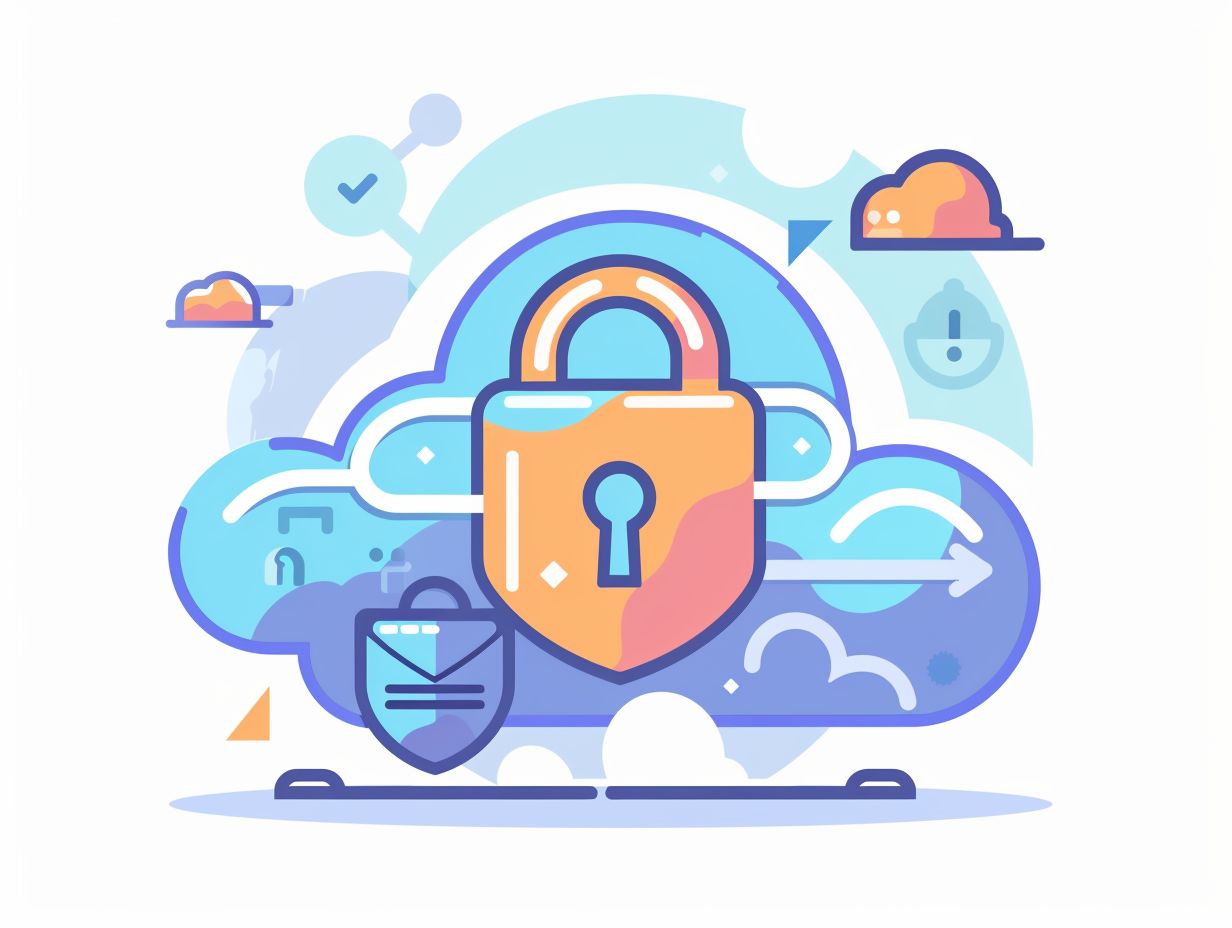Interested in mastering cloud security and advancing your cybersecurity career? The CCNP Security certification from Cisco provides professionals with the chance to enhance their understanding of cloud security, delve into essential concepts and technologies, and get ready for the CCNP Security exam.
The significance of cloud security, career prospects for CCNP Data Center: Mastering Data Center Networking professionals, and practical advice for successfully obtaining this esteemed certification will all be covered.
Explore the advantages of excelling in cloud security!
Key Takeaways:

What is CCNP Security?
The CCNP Security certification is a professional credential offered by Cisco for network security professionals like yourself. It provides individuals with the necessary skills and knowledge to effectively secure Cisco networks and systems.
This certification delves deeper than just basic understanding, focusing on advanced security technologies such as implementing Cisco edge network security solutions, securing network infrastructures, and VPN technologies. The training process includes in-depth coursework that covers various security technologies like Cisco ASA firewalls, VPNs, and IDS/IPS solutions, allowing you to implement and troubleshoot these technologies effectively while mastering security management and threat defense.
CCNP Security plays a vital role in the cybersecurity field by enhancing professionals’ abilities to design, implement, and manage secure networks using the latest Cisco technologies. It also validates expertise in identifying and addressing security threats, making it highly valued in the industry.
Benefits of Mastering Cloud Security
Mastering cloud security presents several advantages for security professionals, such as heightened safeguarding of vital data and applications, increased capacity for threat detection, and secure endpoint management within the dynamic IT environment.
Why is Cloud Security Important?
In today’s cybersecurity landscape, you rely heavily on cloud services and face increasingly sophisticated cyber threats, making cloud security a critical component. It plays a pivotal role in protecting your data, applications, and networks from unauthorized access and potential breaches.
Ensuring strong cloud security is imperative not only to safeguard sensitive information but also to uphold the integrity of your organizational operations. With the introduction of technologies like Cisco’s adaptive security appliance firewalls and the prominence of certifications such as CCNP Security, professionals in the IT industry are placing greater emphasis on implementing stringent security measures in cloud environments. By investing in cloud security practices, you can effectively mitigate cyber threats and cultivate a secure digital environment for your operations.
Career Opportunities for CCNP Security Professionals
Obtaining a CCNP Security certification can offer you a multitude of exciting career prospects within the cybersecurity field. This certification serves as a testament to your ability to implement advanced security solutions and effectively navigate intricate cybersecurity challenges.
Given the escalating prevalence of cyber threats spanning various industries, the demand for proficient CCNP Wireless professionals is steadily increasing. Organizations in sectors such as finance, healthcare, government, and more are actively searching for individuals with specialized knowledge in network security, threat detection, and risk mitigation.
Achieving a CCNP Security certification not only confirms your expertise but also demonstrates your dedication to keeping pace with the ever-evolving practices in cybersecurity. This certification acts as a valuable asset in the competitive realm of cybersecurity careers, equipping professionals with a robust foundation to excel in a variety of roles.
Overview of Cloud Security

Cloud security entails a series of practices, technologies, and policies crafted to safeguard cloud-based assets, data, and infrastructure from cyber threats. It is vital in guaranteeing the confidentiality, integrity, and availability of cloud resources in the digital environment.
Defining Cloud Security and its Components
In terms of cloud security, you need to implement encryption, detection mechanisms, and cybersecurity protocols to protect your cloud-based assets and infrastructure. Understanding these components is crucial for securing critical data and minimizing risks.
Service Provider Security is a key aspect of cloud security as it converts data into a secure format that unauthorized users cannot decipher. Detection mechanisms, like intrusion detection systems (IDS) and intrusion prevention systems (IPS), are essential for monitoring network traffic and detecting potential threats in real-time. Cybersecurity protocols establish guidelines and best practices for maintaining the integrity and confidentiality of data stored in the cloud.
To deepen your understanding of cloud security, consider pursuing certifications such as Cisco’s CCNP Security, which provide comprehensive knowledge of implementing and managing security measures in cloud environments.
Key Concepts and Technologies in Cloud Security
Essential elements in cloud security include virtualization, encryption methods, and access control mechanisms. Understanding these key concepts and technologies is crucial for implementing strong and effective cloud security measures.
Virtualization, Encryption, and Access Control
For safeguard your data, applications, and networks from cyber threats, it is imperative to incorporate essential components of cloud security such as virtualization, encryption, and access control. Understanding the functionalities of these technologies is vital for creating a secure cloud environment.
Virtualization is a crucial aspect that allows the creation of virtual versions of physical resources, facilitating improved resource utilization and scalability within cloud infrastructures. Encryption plays a pivotal role in securing sensitive data by encoding information to ensure that only authorized parties can access it, effectively reducing the risk of data breaches. Access control mechanisms are essential for restricting access to data, ensuring that only authenticated users have permission to view or modify it, thereby decreasing the possibility of unauthorized access and insider threats.
By implementing these security measures in conjunction, you can enhance overall data protection and threat detection capabilities within the cloud, aligning with best practices in professional cybersecurity. These practices are in line with the recommendations for certifications like Cisco’s CCNP Security.
Preparing for the CCNP Security Exam
Preparing for the CCNP Security exam necessitates a thorough comprehension of Cisco security technologies, cybersecurity best practices, and expertise in deploying security solutions. You must utilize the study materials and resources offered through the Cisco Learning Network in order to excel in the exam.
Study Materials and Exam Format

To prepare effectively for the CCNP Security certification exam, you should utilize a variety of study materials, including practice exams, official Cisco guides, and online training courses. Understanding the exam format and requirements is crucial for achieving success in obtaining CCNP Security certification.
The CCNP Security exam evaluates your knowledge and skills in multiple areas of network security, such as implementing Cisco network security solutions, securing network infrastructure, and implementing and troubleshooting secure network connections. By leveraging diverse study materials, you can develop a comprehensive understanding of these topics and improve your capability to address real-world security challenges.
Practice exams allow you to familiarize yourself with the exam structure and the types of questions you may encounter. Official Cisco guides offer detailed insights into Cisco’s CCNP Security: Mastering Firewall and VPN Technologies for network security. Additionally, online training resources provide interactive modules and virtual labs to simulate real-world scenarios and reinforce cybersecurity concepts.
By utilizing a combination of these resources, you can not only pass the CCNP Security exam but also acquire the practical skills necessary for cybersecurity professionalism.
Tips for Success in the CCNP Security Certification
To succeed in the CCNP Security certification, you must possess hands-on experience, proficiency in Cisco technologies, and a comprehensive understanding of threat protection mechanisms. By mastering these key areas, you can significantly improve your preparedness for the certification examination.
Effective Study Strategies and Exam Preparation Techniques
Utilizing effective study strategies and exam preparation techniques is crucial for individuals pursuing the CCNP Security certification. These strategies may include creating a study schedule, practicing with real-world scenarios, and leveraging the resources available through the Cisco Learning Network.
Engaging with real-world scenarios is a key aspect of preparing for the CCNP Data Center certification exam. By immersing yourself in practical situations that mirror the challenges faced in the cybersecurity field, you can deepen your understanding of firewalls, encryption technologies, and other components of network security. Incorporating keywords related to cybersecurity, such as intrusion prevention systems, VPN technologies, and threat detection mechanisms, into your study materials can enhance comprehension and retention.
It is also essential to stay updated on the latest trends and developments in the IT world to adapt to evolving threats and technologies.
Frequently Asked Questions
What is Cisco’s CCNP Security certification and why is it important for mastering cloud security?
Cisco’s CCNP Security certification is a professional-level certification that validates an individual’s skills to design, implement, and manage secure network solutions using Cisco technologies. It is important for mastering cloud security as it covers advanced security concepts and technologies that are essential for securing cloud environments.
What topics are covered in Cisco’s CCNP Security: Mastering Cloud Security course?

The course covers topics such as cloud computing fundamentals, cloud service models, cloud security challenges, Cisco cloud security solutions, and integration of Cisco security tools with cloud environments.
How will Cisco’s CCNP Security: Mastering Cloud Security course benefit my career?
The course will provide you with in-depth knowledge and skills to design, implement, and manage secure cloud environments, making you a valuable asset to organizations that are adopting cloud technologies. It will also enhance your job prospects and open up opportunities for higher-paying roles in the field of cloud security.
Can I take Cisco’s CCNP Security: Mastering Cloud Security course even if I don’t have any prior cloud security experience?
Yes, the course is designed for individuals with at least three to five years of experience in networking and security. However, it is also suitable for those who are new to cloud security but have a basic understanding of networking and security concepts.
How long does it take to complete Cisco’s CCNP Security: Mastering Cloud Security course?
The course duration is approximately 40 hours, which includes lectures, hands-on labs, and self-study activities. The duration may vary depending on the individual’s pace of learning and prior experience.
Is there a recertification requirement for Cisco’s CCNP Security: Mastering Cloud Security certification?
Yes, CCNP Security certifications are valid for three years. To recertify, you can pass a designated recertification exam or advance to a higher level of Cisco certification.
